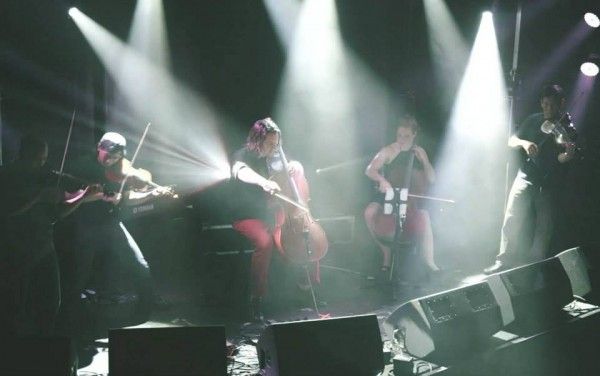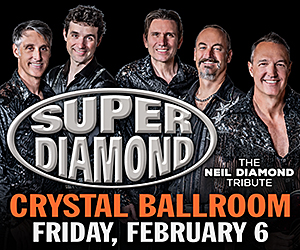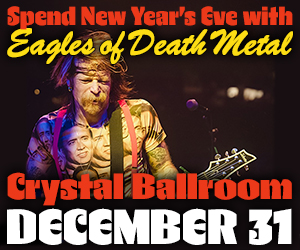Home > Rock
01/16/2015
Musicians Without Borders: Dr. Mike Hsu and ĄRCO-PDX add Classical to a Rock Concert Environment – From OMN the Mag
BY JAMES BASH //
There are plenty of medical doctors who play musical instruments, yet, Mike Hsu is unique among them. That’s because Hsu, a physiatrist at Kaiser Permanente, is performing classical music with his amplified ensemble called ĄRCO-PDX. Hsu has the chops; he’s been playing violin since he was three years old and piano since he was four, performing with orchestras since he was nine, and composing since he was a teenager. Now, at the age of 36, he’s decided to share his love of classical music in a new way, with ĄRCO-PDX, (an acronym meaning “amplified repertory chamber orchestra Portland”).
ARCO-PDX debuted in July and will perform on Sunday, January 17 at Refuge PDX. Oregon Music News spoke with Dr. Hsu about his creative endeavors:
What got you to start ĄRCO-PDX?
I’ve loved classical music all my life. It speaks to me. But, most of my friends don’t listen to classical music, or ever go to classical music concerts. I think that some of the problem comes from the way that classical music is presented. At rock concerts, you are able to stand and move around, talk to your neighbors, laugh, order a drink, that kind of thing. The musicians face you and interact with the audience. Sometimes coordinated lighting is part of the production, maybe pyro-technics too. But, at a classical music concert, you have to sit and listen to something that you’ve never heard before without any interruption. You can’t get up or shift around. That’s pretty challenging. So ĄRCO-PDX is classical music in a rock concert environment.
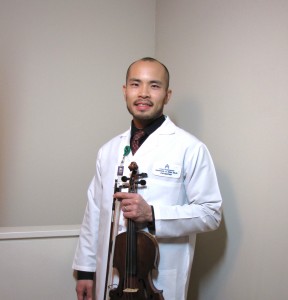
How is ĄRCO-PDX different from Classical Revolution PDX or the Portland Cello Project?
Classical Revolution PDX has basically the same mission, and I’m on its Board. But Classical Revolution PDX has focused primarily on chamber music, while ĄRCO-PDX will work with larger groups. Plus, Classical Revolution is not creating productions that use sophisticated lighting like what we are doing at ĄRCO-PDX. We are also different form the Portland Cello Project because they primarily play covers of familiar tunes. We are doing pieces that are a gateway for people to classical music.
What pieces will ĄRCO-PDX play?
The program is all Vivaldi and all Kenji Bunch. We’ll play the Vivaldi Double Cello Concerto, featuring Liz Byrd and Hannah Hillebrand. Liz is from Vancouver and is widely known for playing in alt-music groups. Hannah just graduated with a Masters from PSU; she is an ICU nurse, part-time – she suggested the Vivaldi. A lot of it is heavy metal, so to speak. We’ll also play Vivaldi’s “Storm at Sea”, which will feature violinist Andy Sumitani. It’s very dynamic and fast. We’ll play Bunch’s “Swing Shift”, a piano trio. Mitchell Falconer is the pianist – he is a new music connoisseur. He has played at Classical Revolution and performs with meticulous discipline. He memorizes everything.
After that is Vivaldi’s “Winter” from the “Four Seasons” and I’ll play the solo for that piece. The last piece is the last movement from “String Circle” by Kenji Bunch. I’ll be playing the rhythmic viola part, and we’ll have Andy Sumitani, Bryce Caster, and Mike Goffe… Liz Byrd will play the cello part. Cellist Owen Hoffmann-Smith will also play some of the pieces and Skip vonKuske, aka cellotronik, will open the show.
Who is doing your lighting?
Friends put me in touch with Matthew Rosvold, “Roz”, for lighting. He does state-of-the-art concert lighting and has had a lot of success at the Star Theater and the Wonder Ballroom. He has different color schemes and arrangement for the pieces that we will be playing. I give him a lot of leeway because I don’t know anything about lighting.
What is your background?
I grew up in a suburb of Chicago and grew up playing in orchestras. I was the concertmaster of the Chicago Youth Orchestra for a year. I went to Harvard where I did my undergraduate degree in Biology with a minor in East Asian Studies. Then, I went to Duke for Med School. At Harvard, I played with the Bach Society Orchestra. That’s a student-run orchestra whose claim to fame is that Yo Yo Ma played with them – probably for one semester. I played with chamber ensembles during my med school years.
How did you get to the Pacific Northwest?
I did a residency in Seattle, and during those four years I played with the Puget Sound Symphony Orchestra. Then I decided to go into research, and looked for a Fellowship and got one which took me to Michigan where I stayed for three years. But, I wanted to get back to the Northwest, which I considered my spiritual home because of the landscape, the hiking, the progressive attitude. A position opened in Portland; so I came here. My wife and I have been here five years!
You also compose music. Are you self-taught?
Yeah, basically. Besides my studies, I’ve learned a lot by just absorbing through osmosis the styles of all these different great composers. The only music theory class that I took formally was a required class at Harvard, if you didn’t major in the Arts. It was called “The Symphonic Century”. The professor explained things like sonata form plainly and simply, so that even non-musicians could understand.
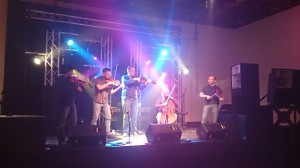
I get a lot of inspiration from non-classical music. When I was in high school, I began to write electronic music, using a rudimentary program on a Macintosh called Super Studio Session. The actual program took only 99k of memory. It allowed you to layer up to eight tracks, and my first project involved describing my favorite video game music. Then I began writing more sim-pop new wave music, because that was what I was listen to at that time.
How many compositions have you written?
On the Electronic/Pop-Rock side, I have two albums – about 20 tracks. On the classical side, I have about six chamber works in various stages of completion, a symphonic work that is 17 minutes long and a work for violin and orchestra. One of my compositions won a contest that was sponsored by the Toscanini Chamber Ensemble. That’s another group at Harvard.
What does a physiatrist do?
It’s kind of like orthopedics and neurology put together without the surgery. We are often involved in rehab, for example, a sprained back.
Good to know!



